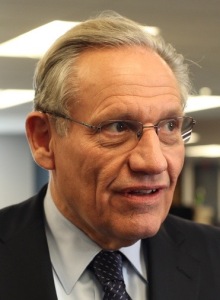
Previously published at WGBHNews.org.
Is The Washington Post “more authoritative” than The New York Times? You might expect investigative reporting legend Bob Woodward to say so. After all, Woodward has spent nearly his entire career at the Post, and institutional loyalty runs deep.
Still, Woodward’s remarks — delivered at a stop on his latest book tour Tuesday night in Harvard Square — come at a time when they’re likely to garner more attention than they otherwise might. Amazon founder Jeff Bezos, who bought the Post from the Graham family nearly two years ago, is sinking money and resources into the paper. And media analysts like Ken Doctor are saying that the Post is making its first serious run at the Times in many years.
Asked by a member of the audience about changes in the media business, Woodward responded with an unsolicited paean to Bezos. “I think he’s helping us as a business,” Woodward said. “It’s a better website. I find things much more authoritative, quite frankly, than The New York Times, to be honest.”
And when asked by his interlocutor, Washington insider-turned-Harvard academic David Gergen, whether newspapers remain committed to investigative reporting, Woodward replied: “I know The Washington Post is, because I asked Jeff Bezos. He has the money. We talked about this. He said I could quote him on this, and I will. He said, ‘Rest assured, Marty’ — Baron, the editor — ‘will have the resources he needs.’”
Woodward will forever be remembered as one-half of the twentysomething reporting duo (with Carl Bernstein) who broke open the Watergate story and brought down Richard Nixon’s presidency. Now a no-longer-boyish 72, Woodward was on hand to promote his latest book, “The Last of the President’s Men.” In it, Woodward tells the story of Alexander Butterfield, the Nixon aide who revealed the existence of the White House taping system before a congressional committee, thus providing the evidence that Nixon really was a crook.
Several hundred people crowded into the First Parish Church for Woodward’s reading, sponsored by the Harvard Book Store. The book is based on some 40 hours’ worth of interviews Woodward conducted with Butterfield, as well as a trove of documents. Butterfield, Woodward said, provided invaluable insights into the inner workings of the Nixon White House, especially of the early years. “For two years, there was no taping system,” he said. “In a sense Butterfield became the tape recorder.”
The event began on a light-hearted note, with Gergen — who served four presidents, including Nixon — asking, “When did you all sense that you were on to something much bigger than you’d thought?” Woodward’s response: “When Nixon resigned.”
The conversation, though, took a darker turn as Woodward described Nixon’s prosecution of the Vietnam War. Perhaps the most disturbing revelation in “The Last of the President’s Men” is that Nixon ordered more and more bombs to be dropped during 1972 — the year he was up for re-election — even though he secretly acknowledged it had accomplished “zilch.” The reason, Woodward said, was that polling showed the bombing campaign was popular with the American public.
“It’s close to a war crime,” Woodward said.
Equally nauseating was Nixon’s response to journalist Seymour Hersh’s revelation in 1969 that American troops had massacred civilians in the village of My Lai. Nixon ordered Butterfield to go after everyone involved in exposing it, including the soldier who blew the whistle, Life and Time magazines and a perceived enemy who Woodward said was described by Nixon as “a liberal Jew.”
The mood brightened considerably when Gergen asked Woodward how he would go about investigating the leading 2016 presidential candidates, Donald Trump and Hillary Clinton. Woodward said he would talk about Trump first, and then brought down the house with this: “Can we ask the audience a question? How many people want the next president to be somebody who has no touch with reality?”
As for Clinton, Woodward turned the tables and questioned Gergen.
Woodward: “You worked with her.”
Gergen: “I did.”
Woodward: “Do you trust her?”
Gergen paused before answering: “I have found — I don’t think she — I don’t think she tells lies. I think she’s careful with the truth.”
Woodward, after the laughs had faded away: “You didn’t get to work for all these presidents for no reason.”
Notwithstanding Woodward’s enthusiasm for Jeff Bezos’ ownership of the Post, his talk was, in some respects, an elegy for the kind of journalism Woodward represents. Whether you prefer the Post or the Times, at their best they stand for a rigor that often seems to be on the wane.
For all the faults of the 1970s-era press, there was something approaching a national consensus that made it possible for a story like Watergate to keep building. These days, the media are too fragmented, with too many so-called news outlets aligned with partisan interests. Fox News chief Roger Ailes would release his flying monkeys to go after the liberal media and it would all end in a standoff.
Though Woodward’s establishment-oriented journalism is sometimes criticized, including by none other than the aforementioned Hersh, he nevertheless represents something important: the power of the press to do good through thorough, indefatigable reporting aimed at rooting out the truth rather than serving some ideological cause.
Thanks for the assist from Kylie Ayal, a third-year journalism student at Boston University, who supplied me with a copy of her audio file of the event after I managed to erase mine by mistake.